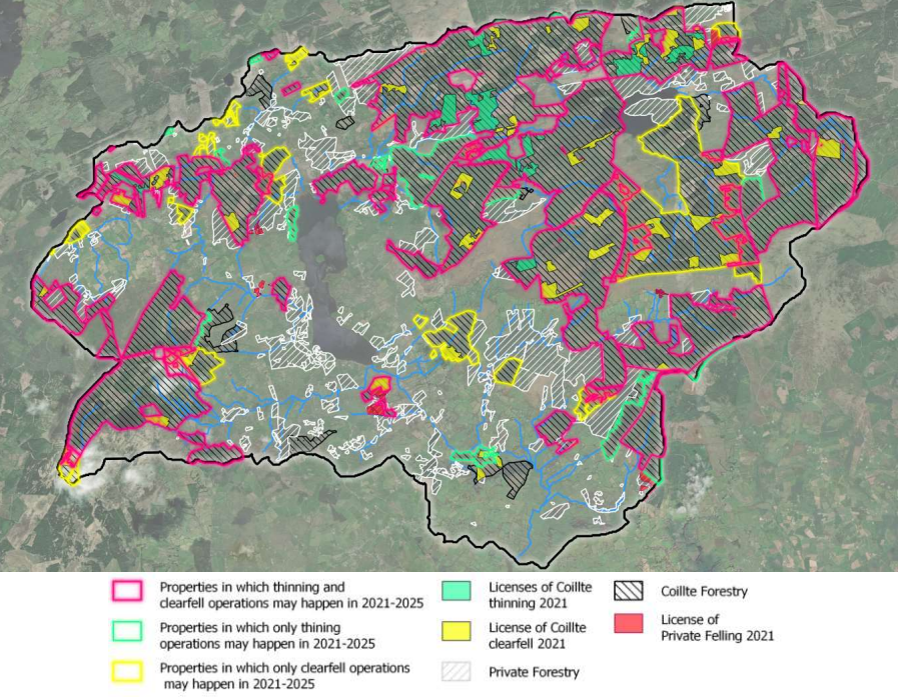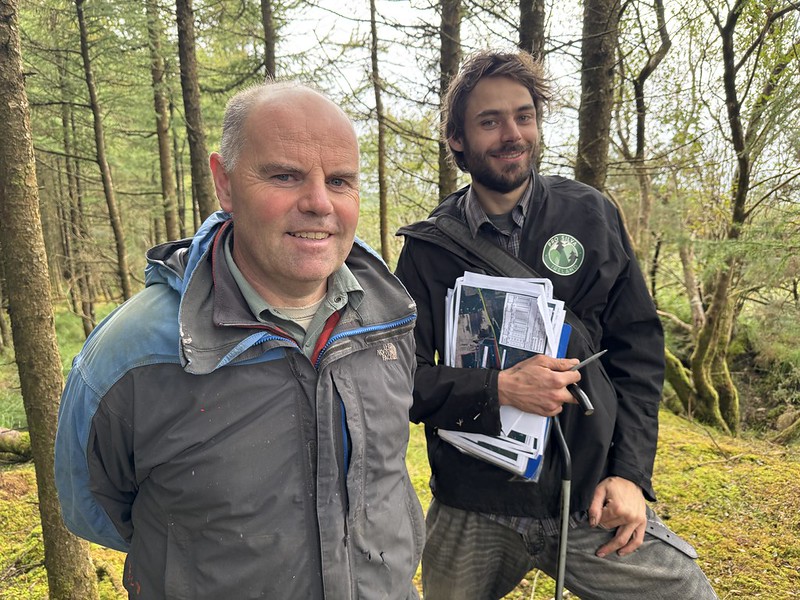
Free Expert Forestry Advice Now Available To Land Owners in Waters of LIFE Sub-Catchments
Waters of LIFE have secured the services of a team of registered foresters to provide expert forest management advice and support to the project.
Following a successful tender process, Purser Tarleton Russell Ltd will work with both public and private foresters on behalf of the project. They will also provide direct support to landowners within Waters of LIFE sub-catchments who want to improve water quality through tree planting measures.
Speaking about the announcement, Water of LIFE Senior Scientist Regan Phipps said:
“This is a really welcome development for the project and it’s a timely addition of resources to our project. Our pilot agri-environmental programme for farmers is now operational, but it’s just one pillar of our project. Forestry is the biggest pressure in the Avonmore and Graney sub-catchments so that’s our biggest focus in those areas.”
“Paddy Purser and his team have really hit the ground running with the project and are already out meeting landowners. This is a fantastic opportunity for communities to access specialist support and advice from experts in this field, free of charge.”
“I’d encourage anyone who’d like to know more about tree planting and forestry management in our demonstration catchments to complete the expression of interest.”
Click to complete the expression of interest for forestry support.
Alternatively you can contact your local catchment scientist.
- Avonmore, Co. Wicklow: Mark Desmond +353861986343
- Awbeg (Kilbrin), Co. Cork: Fergal Scully +353868322078 and Diarmuid McSweeney +353873419907
- Graney, Co. Clare / Co. Galway: Ruth Bennett Coady +353868181461
- Islands, Co. Galway / Co. Roscommon: John Kelly +353862013578
- Shournagh, Co. Cork: Fergal Scully +353868322078 and Diarmuid McSweeney +353873419907
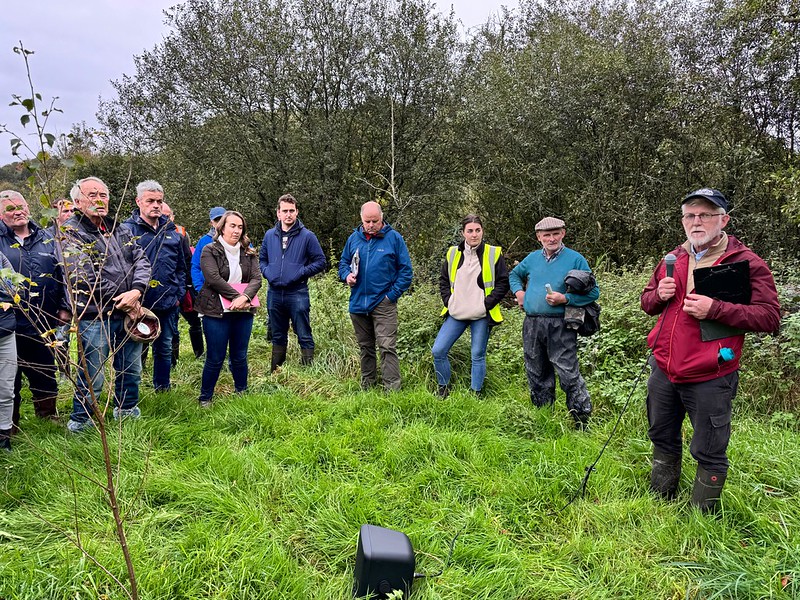
Paddy Purser is the lead forester for the new team and will also provide dedicated support in the Avonmore sub-catchment in Wicklow.
Paddy will be working with independent foresters Padraig O’Tuama and Julius Silvan. Padraig O’Tuama will operate in the Cork sub-catchments (Awbeg (Kilbrin) and Shournagh) and Julius Silvan will operate in the western sub-catchments (Graney and Islands).
The team have extensive field experience working in surveying, inventory mapping, forest stand/site assessments and local stakeholder engagement.
They have specialist skills in continuous cover forestry and native woodland management. They have also worked closely with a number of water quality and habitat restoration projects including the Kerry LIFE project and Freshwater Pearl Mussel projects.
Direct supports for landowners:
The Waters of LIFE registered forestry team will also be working directly with interested landowners in project sub-catchments.
Landowners with potential tree-planting sites of any size are welcome to express their interest in this direct support from the project by completing the form at Foresters – Waters of Life
Suitable candidates will meet with a registered forester and receive advice on potential options. These include planting native woodland or managing existing plots to reduce impact on water quality. Landowners are also fully supported with any relevant applications for consent, licensing or funding.
This service is only available to landowners in the Avonmore, Awbeg (Kilbrin), Graney, Islands and Shournagh Waters of LIFE project sub-catchments. It is a limited service and may be subject to a suitability screening assessment.
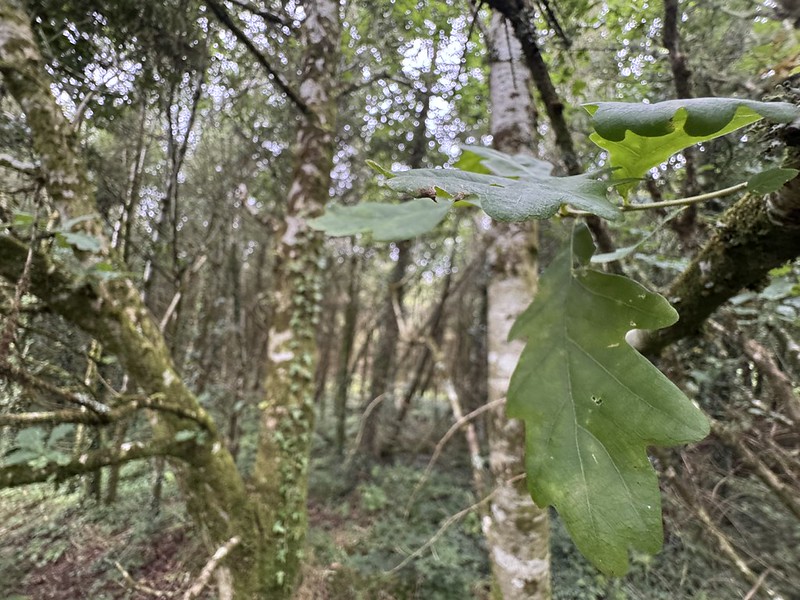
Funded Tree-Planting Initiatives For Land Owners:
Waters of LIFE funds tree-planting as a supporting action to participants of its agri-environmental programme pilot. The project’s registered forestry team can advise on this as well as a number of national funding programmes for tree-planting.
The Forestry Programme 2023-2027 is operated by the Department of Agriculture, Food and the Marine to incentivise tree planting on farms.
There are twelve ‘Forest Type’ options available to farmers to plant a new forest. The Department covers 100% of the costs to establish the forest, and all payments and earnings are income tax free.
Full information is available in the department’s Farm Forestry Booklet. The booklet also gives information about the Native Tree Area Scheme for farmland which has two strands open to promote tree planting on farm land.
NTA 1 – Creation of Small Native Forests
Grant/ha (excluding fencing): €6,744
Premium: €2,206 for 10 years
Tree planting area: Must be between 0.1 and 1.0 hectare. Minimum width: 20m
NTA 2 – Creation of Native Forests for Water Protection
Grant/ha (excluding fencing): €6,744
Premium: €2,284 for 10 years
Tree planting area: Must be between 0.1 and 1.0 hectare. Maximum width: 20m
Tree planting in riverside margins is also a funded support action in the Waters of LIFE agri-environment programme pilot.
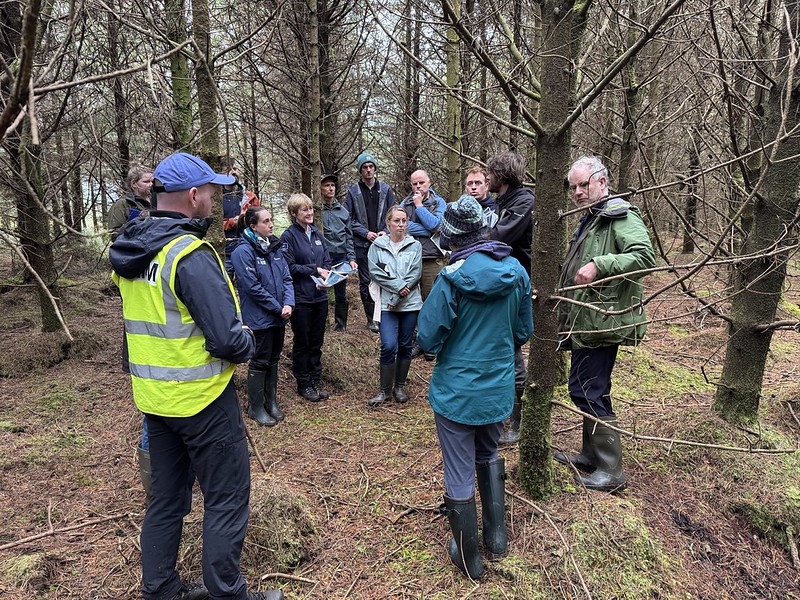
Why is important to work with a registered forester?
Registered foresters manage the paperwork and approvals for all tree planting of areas greater than 0.1 hectares. There are 150-200 registered foresters in Ireland.
Any application to plant new forests in Ireland must be done through a registered forester.
Registered foresters also advise land owners on whether their land is suitable for tree planting and what funding options are available to them.
This service is now available free of charge to landowners in Waters of LIFE demonstration sub-catchments.
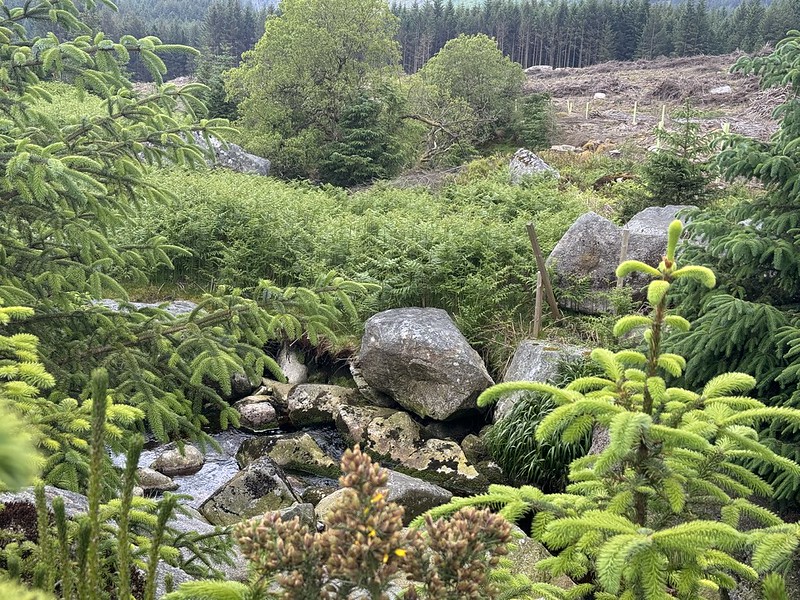
Forestry in Waters of LIFE sub-catchments:
LAWPRO local catchment assessments identified forestry as a significant pressure in the Waters of LIFE Graney and Avonmore sub-catchments.
Over half of the Graney sub-catchment in South East Clare and Galway is forested – 41.8% Coillte and 11.2% private. Forestry is listed as a pressure in six of its 10 water bodies: Bleach_10; Bleach_20; Graney (Shannon)_10; Graney (Shannon)_20; Graney (Shannon)_30; Corra_20.
Almost a quarter of the Avonmore sub-catchment in Wicklow is forested – 18.6% Coillte and 5.8% private. Forestry is listed as a pressure in four of its 10 water bodies: Avonmore_40; Avonmore_20 (including Inchavore river); Glenmacnass_10; Glenmacnass_20.
Forestry creates issues for water quality when works such as planting or felling increase soil erosion and the amount of fine sediment and nutrients entering rivers. Water channels running directly into rivers from commercially forested areas can carry excess fine sediment and nutrients. Water channels from peaty areas can also cause higher acidity levels.
The planting of native woodland can also have great benefits for nature. Trees can be planted in riverside areas to improve water quality by giving greater protection to the river channel and boosting the biodiversity.
Solutions to forestry as a pressure on water quality:
The Graney and Avonmore sub-catchments were chosen as Waters of LIFE demonstration sub-catchments in consultation with Coillte and the Forest Service. This was so that mitigation actions and strategies could be trialled while commercial forestry activity was taking place.
Waters of LIFE have completed a desk study of existing commercial forestry within its sub-catchments. This work included assigning risk scores to forest plots based on their potential to impact water quality.
A summary of the desk study will be published by the end of 2025.
The Waters of LIFE registered forestry team will support with the next stages of the project’s approach to forestry management, including the ground-truthing of risk assessment and working with public and private forestry owners to put actions in place where harvesting is planned.
This will lead to the development of Forest Management Plans with actions that can be trialled for best practice and evaluated for use at a national level.
Click to complete the expression of interest for forestry support.
